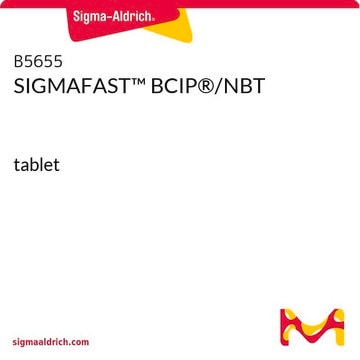B6149
5-Bromo-4-chloro-3-indolyl phosphate disodium salt
chromogenic, ≥98% (HPLC), powder
Synonym(s):
5-BCIP disodium salt, BCIP®, X-phosphate disodium salt
About This Item
Recommended Products
product name
5-Bromo-4-chloro-3-indolyl phosphate disodium salt, ≥98% (HPLC)
Quality Level
Assay
≥98% (HPLC)
form
powder
solubility
H2O: 20 mg/mL
DMF: insoluble
storage temp.
−20°C
SMILES string
[Na+].[Na+].[O-]P([O-])(=O)Oc1c[nH]c2ccc(Br)c(Cl)c12
InChI
1S/C8H6BrClNO4P.2Na/c9-4-1-2-5-7(8(4)10)6(3-11-5)15-16(12,13)14;;/h1-3,11H,(H2,12,13,14);;/q;2*+1/p-2
InChI key
OAZUOCJOEUNDEK-UHFFFAOYSA-L
Looking for similar products? Visit Product Comparison Guide
Related Categories
Application
BCIP is provided in two salt forms: the disodium salt which is soluble in water and the p-toluidine form which is soluble in dimethylformamide. These salt forms may be used to prepare a stock solution that in combination with NBT and a reaction buffer, form a substrate solution for alkaline phosphatase. This substrate system, when incubated with alkaline phosphatase, produces an insoluble NBT diformazan product that is easily observable with its purple color. For added convenience, a mixture of BCIP and NBT is provided in an easily dissolvable tablet form or as a ready-to-use liquid.
Substrates
Legal Information
Storage Class Code
11 - Combustible Solids
WGK
WGK 3
Flash Point(F)
Not applicable
Flash Point(C)
Not applicable
Personal Protective Equipment
Certificates of Analysis (COA)
Search for Certificates of Analysis (COA) by entering the products Lot/Batch Number. Lot and Batch Numbers can be found on a product’s label following the words ‘Lot’ or ‘Batch’.
Already Own This Product?
Find documentation for the products that you have recently purchased in the Document Library.
Customers Also Viewed
Articles
NBT-BCIP substrate system aids in western blotting and immunohistological staining, producing a blue-purple insoluble end product.
NBT-BCIP substrate system aids in western blotting and immunohistological staining, producing a blue-purple insoluble end product.
NBT-BCIP substrate system aids in western blotting and immunohistological staining, producing a blue-purple insoluble end product.
NBT-BCIP substrate system aids in western blotting and immunohistological staining, producing a blue-purple insoluble end product.
Our team of scientists has experience in all areas of research including Life Science, Material Science, Chemical Synthesis, Chromatography, Analytical and many others.
Contact Technical Service







